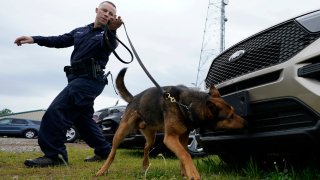
Asking dogs to follow their noses won't work anymore in states that have legalized marijuana.
As Virginia prepares to legalize adult possession of up to an ounce of marijuana on July 1, drug-sniffing police dogs from around the state are being forced into early retirement, following a trend in other states where legalization has led to K-9s being put out to pasture earlier than planned.
In Virginia, the rush to take marijuana-detecting dogs out of service began even before lawmakers voted last month to accelerate the timetable for legalization. A separate law that went into effect in March prohibits police from stopping or searching anyone based solely on the odor of marijuana.
Virginia state police are retiring 13 K-9s, while many smaller police departments and sheriff’s offices are retiring one or two dogs. Most are in the process of purchasing and training new dogs to detect only illicit drugs, including cocaine, heroin and methamphetamines. Some departments are unable to afford up to $15,000 to buy and train a new dog, so they are disbanding their K-9 units.
Get top local stories in Southern California delivered to you every morning. >Sign up for NBC LA's News Headlines newsletter.
The dogs trained on multiple drugs alert in the same way for all of them, so it's impossible to tell whether they are indicating the presence of marijuana or an illicit drug. The dogs also cannot distinguish between a small, legal amount of marijuana or a larger, still-illegal amount of the drug. For police, that means they can no longer be used to establish probable cause for a search.
“We won't use our dogs trained in marijuana because that could be a defense an attorney would raise for a client, to say, 'Which odor did the K-9 alert on — was it marijuana or was it an illegal drug?" said Bedford County Sheriff Mike Miller.
Using a dog that has been trained to detect all drugs except marijuana can help "guarantee he didn’t hit on marijuana, that he found heroin or something else,” Miller said.
Local
Get Los Angeles's latest local news on crime, entertainment, weather, schools, COVID, cost of living and more. Here's your go-to source for today's LA news.
Miller's office retired one dog and is now using a second dog for tracking and apprehension duties only, not for drug detection. His office also bought a new dog not trained on the scent of marijuana; that dog will be used to detect other drugs. Miller said he'd like to purchase a second drug-sniffing dog, but isn't sure when he will find the money in his budget.
Other states that legalized marijuana earlier have had to make similar adjustments.
“The trend is everywhere,” said Don Slavik, executive director of the United States Police Canine Association.
“Once you train a behavior in a dog, that never goes away. They don't want any mistakes, so that is why they want to bring in new dogs,” he said.
A 2017 ruling from the Colorado Court of Appeals solidified concerns that using marijuana-trained dogs in places where the drug is legal may not withstand legal challenges.
Kilo, a Moffat County Sheriff's Office dog trained on multiple drugs, alerted on a man's truck during a 2015 traffic stop. Officers found a methamphetamine pipe containing white residue. The court found that Kilo's alert was not a reliable indicator of illegal activity because the dog could not differentiate between marijuana and an illegal drug. The court overturned the man's drug possession conviction, finding that police did not have legal grounds to search his truck. The ruling was later upheld by the Colorado Supreme Court.
In Massachusetts, where recreational marijuana became legal in 2016, the Quincy Police Department shifted two dogs from drug detection to patrol work, then retired them about 18 months later.
Lt. Bob Gillan, the department's K-9 Unit Supervisor, said drug traffickers quickly figured out how to raise doubt about the legality of a search by a dog trained to detect marijuana.
“Usually, when they're delivering their illegal drugs, they will always have marijuana burning in the car. Any defense attorney worth his or her salt will say, ‘Well, your dog hit on a legal substance,’ (not the illegal drugs),” he said.
Sgt. Scott Amos, the canine training coordinator for Virginia State Police, said that with the July 1 legalization date approaching, police are busy training new dogs to detect MDMA, also known as ecstasy; cocaine, heroine and methamphetamines, while also getting 13 dogs ready for retirement. Apollo, Aries, Bandit, Blaze, Jax, Kane, Mater, Nina, Reno, Sarge, Thunder, Zeus and Zoey are being adopted by their handlers, Amos said.
Cumberland County Sheriff Darrell Hodges said his office recently had to retire its drug-detecting K-9, a Belgian Malinois named Mambo. He said his 17-person department doesn't have the money to purchase and train a new dog.
“You work with them day in and day out, and they become part of you, and to just take it away is kind of tough,” he said.
Hodges said all turned out well for Mambo, who was adopted by his handler.
“The dog is actually living a wonderful life,'" he said. “He has his own bedroom in a house and is getting spoiled rotten.”



